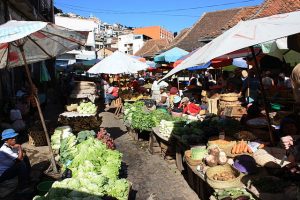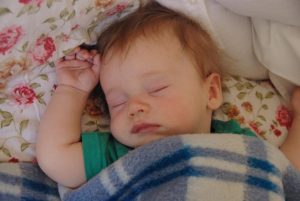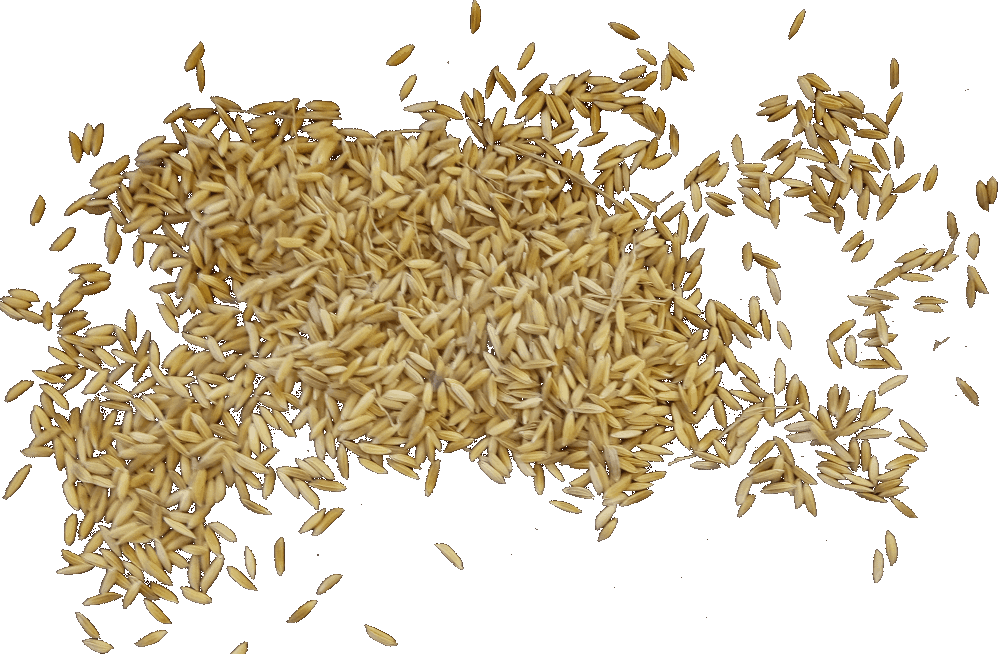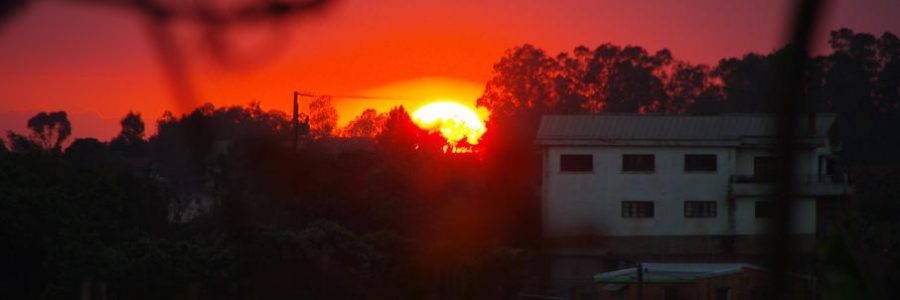ABO (Africa Based Orientation)
After an eight hours flight we arrived at 8 pm (Saturday the 10th of October) on Nairobi airport. The first three nights we stayed at AIM’s guest house. From there we travelled on to the ABO conference at Nakuru.
 We were not alone! A total of 22 adults and 28 children joined us and they were all ready to serve the Lord at different places. To see a bigger version of the photo on the richt you can click on it. The first week at ABO we have studied the African culture and values. Among our tutors was a Kenyan man who lived in the UK for several years. This made that he could relate to our western culture as well as to the African culture. It was good to talk with other missionaries—some of who already work in Africa for several months or even years. We have learned a lot from each other.
We were not alone! A total of 22 adults and 28 children joined us and they were all ready to serve the Lord at different places. To see a bigger version of the photo on the richt you can click on it. The first week at ABO we have studied the African culture and values. Among our tutors was a Kenyan man who lived in the UK for several years. This made that he could relate to our western culture as well as to the African culture. It was good to talk with other missionaries—some of who already work in Africa for several months or even years. We have learned a lot from each other.
Other subject were healthcare, safety and world-view… What to do when you are bitten by a snake or what are the symptoms of certain parasites. The last week we have discussed how missionaries can make a real change in people life and finally we looked at several world religions.
Visit Local Church
All three Sundays we were assigned to a local AIC (Africa Inland Church). We have introduced ourselves and Jurgen gave his testimony on the first Sunday. Our names are not that easy to pronounce so soon Jurgen became ‘babba Isaiah’ and Katja ‘mamma Isaiah’ (after our oldest son Issa, which is Swahili for Isaiah). Guests, especially mzungus (white man), can not make themselves scares. Obviously Jurgen could do the sermon and Katja would probably have good ideas to share on Sunday school… Uh? Yes, sure… of course, no problem.
After the church service we were invited to some ones home to eat lunch. That was a great experience. The lady of the house washed our hands and after that she served the food. We have noticed how proud the people were of there property, and thus they had no problem with us taking photos and recording it. The last Sunday one of the elders invited us to his home. It was a bit further away so the pastor suggested that we could take his car. ‘Babba Isaiah, you can drive… can you?’ Well, of course Jurgen can drive! That is to say, the road… Wow, rally roads are smooth compared to these! Anyway, they wanted to spare us the pain of walking as mzungus are not used to that (and they are probably right on that). The other elders came 40 minutes later and said that the walk did them good. On our way back the pastor drove us and his kids were coming along… 10 people will fit just fine in one car, in Africa it does! All in all, it was a great day and we have enjoyed the hospitality and kindness of our Kenyan brothers and sisters very much.
How Did the Children Like it?
Vanya said that she really liked it. They have made several nice crafts that had to do something with the African cultures. She said that the lessons about the “do’s and the don’ts” were very good. For example they have learned that for children, in an African setting, it would be considered impudent to look older people straight in the eyes. Vanya said that she is happy to know that in advance.
Issa: ‘There was a nice playground and the food was good! I also made new friends. We have learned lots about 14 different animals and countries.’
Abbey: ‘I liked the teaching about other countries. We also did fun projects. The snacks were great and we also played games.’
Dani: ‘The teacher gave me a book and that was all.’
Simeon: ‘…. ‘
Antananarivo, Madagascar
On the 6th of November we travelled on to our final destination Tana, Madagascar. We have a fine place to live and every now and then we make outings to the local marked. The children enjoy themselves in the garden and with the children of the neighbourhood.
We regularly make some video recordings which we will upload when the internet and electricity allows us to. You can watch them on our multimedia page.
Introduction and language learning
We are busy learning the Malagasy language. This is not a simple task. Jurgen never had France in school but still he can follow Katja’s France conversations. This is because our languages (France, German, Dutch etc.) have similarities. These similarities cannot be found in the language of Madagascar. Not a single reference point and a totally different grammar. Nonetheless, we did learn some words like ‘hello’ (manao hoana), ‘sorry’ (azafat), and ‘thank you’ (misaotra anao). Also some sentences like ‘my name is …’, ‘what is you name?’, and ‘how are you doing?’. We enjoy learning a new language but it is exhausting.
The AIM-Madagascar unit leader, Anna Jarmy, is helping us with the introduction. We discuss our tasks which will be mainly language learning for the first period. To speed things up, Anna will try to find us a language helper. Furthermore, she said that the normal procedure is to stay with a local family for a few days. This is less straightforward as it sounds because how do you find a family that can house seven persons extra. We will wait and see.
Visa
At the moment we are trying to get our work visa. This is quite complicated as we do not speak Malagasy yet and locals are not very good in France. We are happy to receive help from Parany, a man who works at the AIM office in Tana, who speaks English. Still, we try to do many things ourselves as this helps a lot in getting to know the people and culture. The walks to different offices is an adventure on its own. People initially greet us in France (bonjour), but are surprised when we greet them back in Malagasy (‘Manao Hoana’ or ‘Salama’). When we finish all preliminary works we will hand over the task of getting the visa to a man called Roland. He is a well known man at the official offices and will not likely be ‘run over.’
Food
 Buying food is fun. Delicious mangos for only € 0,08 and banquettes for only € 0,11. We can buy all sorts of things on the market. This week we bought 1 kilo tomatoes, 1 kilo carrots and about 400 grams of beans for 2400 Ariary (€ 0,67). Other things are more difficult to find. Full grain bread is hard to come by and can only be found in the supermarket but than you will have to be prepared to pay more.
Buying food is fun. Delicious mangos for only € 0,08 and banquettes for only € 0,11. We can buy all sorts of things on the market. This week we bought 1 kilo tomatoes, 1 kilo carrots and about 400 grams of beans for 2400 Ariary (€ 0,67). Other things are more difficult to find. Full grain bread is hard to come by and can only be found in the supermarket but than you will have to be prepared to pay more.
Different culture!
That we have arrived in a different culture is obvious. We already received two spontaneous visits. This means that you just stop with whatever you were doing and make some coffee, offering biscuits or the like and chat. This chatting is less straightforward as you might have guessed but, because we do know some of the cultural rules, we have done well. You need to offer the guest some biscuits first and place them on the table. Of course all the biscuits need to be eaten, a tradition the children do not mind. Jurgen and Vanya were going to visit someone’s house as well. They prepared their table with six classes but where were Katja and the children? Jurgen told them that they were very tired and that he only brought along his oldest child. This was pleasing as Vanya was a good representative of the children and the host was relieved to understand that the others did not stay home because of him. On Madagascar it is not necessarily the oldest boy who is most important (like in Kenya) but the oldest child. In Kenya we were the ‘father or mother of Issa’ but here we are ‘dadda/mamma nie Vanya’ (father or mother of Vanya).
If you want to know more about these differences we can recommend Sarah A. Lanier’s book, ‘Foreign to Familiar’ (for sale at e.g. Amazon). Sarah lived for eleven years in Holland and she is very good in explaining the differences between cold climate culture (with Holland as a strong example) and warm climate cultures.
 We love to see all the learned theory in action. At the same time we are very tired at the end of the day. This ‘end of the day’ is about 6 pm—the sun has gone under by then and will be up as early as 05:20. Thus our day starts at 6 am and around 9 pm we are already in our snug beds… talking about which…
We love to see all the learned theory in action. At the same time we are very tired at the end of the day. This ‘end of the day’ is about 6 pm—the sun has gone under by then and will be up as early as 05:20. Thus our day starts at 6 am and around 9 pm we are already in our snug beds… talking about which…
It is time to stop. We could write on but we will keep that for next time.
We wish you Gods rich blessings or in Malagasy ‘Andriamanitra ny fitahian’.

